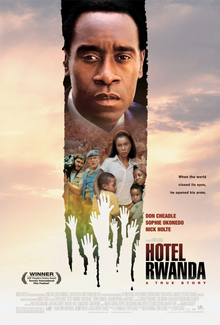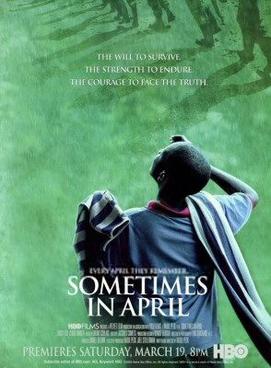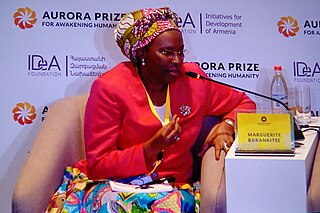The Hutu, also known as the Abahutu, are a Bantu ethnic group which is native to the African Great Lakes region. They mainly live in Rwanda, Burundi, and Uganda where they form one of the principal ethnic groups alongside the Tutsi and the Great Lakes Twa.
The Tutsi, also called Watusi, Watutsi or Abatutsi, are an ethnic group of the African Great Lakes region. They are a Bantu-speaking ethnic group and the second largest of three main ethnic groups in Rwanda and Burundi.

The Rwandan genocide, also known as the genocide against the Tutsi, occurred from 7 April to 19 July 1994 during the Rwandan Civil War. Over a span of around 100 days, members of the Tutsi ethnic group, as well as some moderate Hutu and Twa, were systematically killed by Hutu militias. While the Rwandan Constitution states that over 1 million people were killed, most scholarly estimates suggest between 500,000 and 662,000 Tutsi died. The genocide was marked by extreme violence, with victims often murdered by neighbors, and widespread sexual violence, with between 250,000 and 500,000 women raped.

Hotel Rwanda is a 2004 biographical historical drama film co-written and directed by Terry George. It was adapted from a screenplay by George and Keir Pearson, and stars Don Cheadle and Sophie Okonedo as hotelier Paul Rusesabagina and his wife Tatiana. Based on the Rwandan genocide, which occurred during the spring of 1994, the film depicts Rusesabagina's efforts to save the lives of his family and more than 1,000 other refugees by providing them with shelter in the besieged Hôtel des Mille Collines. Hotel Rwanda explores genocide, political corruption, and the repercussions of violence.

This is a bibliography for primary sources, books and articles on the personal and general accounts, and the accountabilities, of the 1994 Rwandan genocide.

Sometimes in April is a 2005 American made-for-television historical drama film about the 1994 Rwandan Genocide, written and directed by the Haitian filmmaker Raoul Peck. The ensemble cast includes Idris Elba, Oris Erhuero, Carole Karemera, and Debra Winger.

Marguerite (Maggie) Barankitse is a Burundian humanitarian activist who works to improve the welfare of children and challenge ethnic discrimination in Burundi. After rescuing 25 children from a massacre, she was forced to witness the conflicts between the Hutu and Tutsi in her country in 1993. She established Maison Shalom, a shelter that provided access to healthcare, education, and culture to over 20,000 orphan children in need. Because she protested against a third term for President Pierre Nkurunziza, she lives in exile.
Hutu Power is an ethnic supremacist ideology that asserts the ethnic superiority of Hutu, often in the context of being superior to Tutsi and Twa, and therefore, they are entitled to dominate and murder these two groups and other minorities. Espoused by Hutu extremists, widespread support for the ideology led to the 1994 Rwandan genocide against the Tutsi and the members of their families, the moderate Hutu who opposed the killings, and the Twa, who were considered traitors. Hutu Power political parties and movements included the Akazu, the Parmehutu, the Coalition for the Defence of the Republic and its Impuzamugambi paramilitary militia, and the governing National Republican Movement for Democracy and Development and its Interahamwe paramilitary militia. The belief in the theory that Hutu people are superior is most common in Rwanda and Burundi, where they make up the majority of the population. Due to its sheer destructiveness, the ideology has been compared to Nazism in the Western world.
Pierantonio Costa was an Italian businessman, and diplomat who was the Italian honorary consul in Kigali during the Rwandan genocide in 1994. He was noted for the humanitarian assistance and safe passages that he arranged for over 2,000 people including over 375 children fleeing violence during this time. He was a recipient of the Commander of the Order of Merit of the Italian Republic honor. He was nominated for the 2011 Nobel Peace Prize along with two Rwandan women Zura Karuhimbi and Yolande Mukagasana.

Deogratias: A Tale of Rwanda is a graphic novel written and drawn by Jean-Philippe Stassen, published by First Second Books.
During the Rwandan genocide of 1994, over the course of 100 days, up to half a million women and children were raped, sexually mutilated, or murdered. The International Criminal Tribunal for Rwanda (ICTR) handed down the first conviction for the use of rape as a weapon of war during the civil conflict, and, because the intent of the mass violence against Rwandan women and children was to destroy, in whole or in part, a particular ethnic group, it was the first time that mass rape during wartime was found to be an act of genocidal rape.

Yolande Mukagasana is a Rwandan writer writing in French who is a survivor of the 1994 genocide against the Tutsi.
Marie Béatrice Umutesi is a Rwandan writer, NGO worker, peace activist and refugee living in Belgium.

Tatiana Rusesabagina is a Rwandan women who, with her husband Paul Rusesabagina, survived in Hôtel des Mille Collines during the 1994 Rwandan genocide, and saved over a thousand people from being murdered. Their story was the basis for the 2004 film Hotel Rwanda, in which Tatiana was portrayed by Sophie Okonedo, who was nominated for an Academy Award for Best Supporting Actress for her performance as Tatiana.

Our Lady of the Nile is a French-language novel by Rwanda-born writer Scholastique Mukasonga, originally published in 2012 by Éditions Gallimard. It is Mukasonga's fourth book and first novel. The English-language translation, published in the United States in 2014 by Archipelago Books, was done by Melanie Mauthner, a poet and writer from the United Kingdom.
Zura Karuhimbi was a Rwandan woman who saved more than 100 people from being killed by Hutu militias during the 1994 Genocide Against the Tutsi in Rwanda. A traditional healer, she hid the refugees in her house and deterred attackers by exaggerating her reputation as a witch. Her role was recognized in 2006 by the award of the Campaign Against Genocide Medal by Rwandan President Paul Kagame.

In Praise of Blood: The Crimes of the Rwandan Patriotic Front is a 2018 non-fiction book by Canadian journalist Judi Rever and published by Random House of Canada; it has also been translated into Dutch and French. The book describes alleged war crimes by the Rwandan Patriotic Front (RPF), Rwanda's ruling political party, during its ascent to power in the 1990s.

The Day God Walked Away is a 1 October 2009 Franco-Belgian drama film on the fate of women in the 1994 Rwandan genocide. currently known as genocide against Tutsi, This was confirmed officially by the United Nations Generical assembly designated 7 April, as the international Day of reflection on the 1994 Genocide against Tutsi in Rwanda. The drama was directed by Philippe Van Leeuw
Josephine Dusabimana is a Rwandan woman who saved the lives of 12 Tutsis during the Rwandan genocide.










